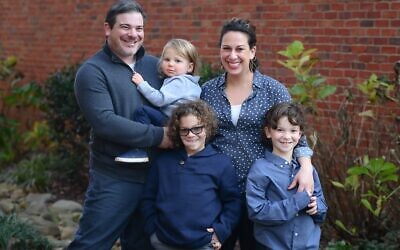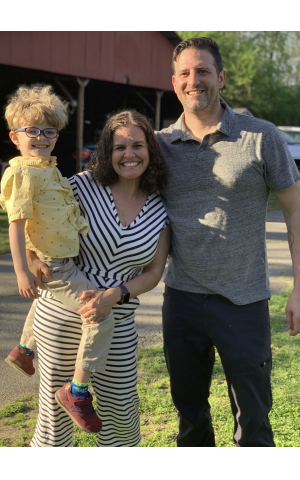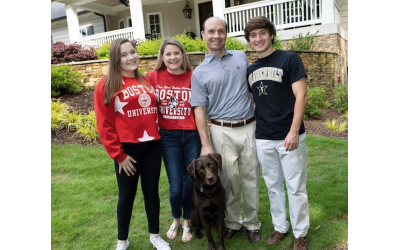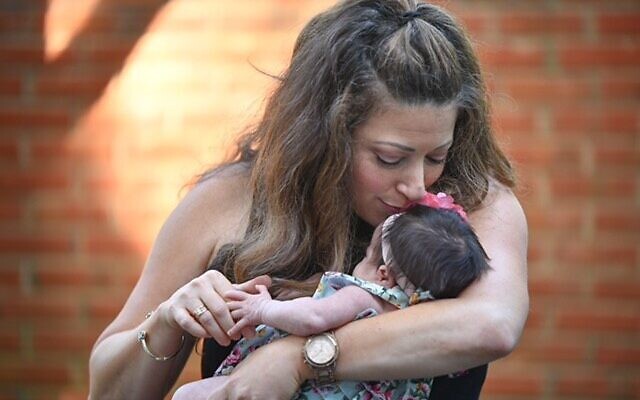Alternate Paths to Motherhood
Five Atlanta women took different routes in their determination to become mothers.
The Jewish Fertility Foundation reports that one in six women in the Jewish community experience infertility, which the Centers for Disease Control and Prevention describes as the inability to get pregnant after one year or longer of unprotected sex. Today, adoption and the assisted reproduction technologies of in vitro fertilization, gestational surrogacy, egg, sperm and embryo donation offer paths to motherhood.
Infertility Treatment

Elana Frank experienced medical infertility for over 10 years. She underwent countless rounds of intrauterine insemination, IVF cycles and embryo donation to successfully have her own three babies. Residing in Israel at the time, socialized medicine inexpensively enabled her to have her first two children. Returning to her hometown of Atlanta in 2015, she was uninsured for the procedure involved with her third child’s birth.
Frank founded JFF to help others with treatment, support and financial aid to deal with years of miscarriages, overwhelming debt and heartache before finally giving birth, if at all.
Adoption
Sonja and husband Tommer Ender had one gestational son and wanted more children. Their adoption, from a now-closed agency, took four years, including almost a year to complete the required paperwork. With five other families, they traveled to a Chinese orphanage in 2017 to pick up their daughter. None of the six families was able to adopt an infant. After remaining in China for three stressful weeks, the Enders adopted a 2 ½-year-old child one day after they met her.

Sonja Ender, a nurse, tells the AJT, “During the four years between initiating and completing the adoption, the process was delayed for a year and a half when we had another biological child. Once our son Benny was 1 year old, we were able to receive referrals about adoption from China. Our daughter Ella was a beautiful, shy girl who had lots of developmental catching up to do. She hardly walked when we met her, and she didn’t talk for over a year after we adopted her, but she doesn’t stop talking now! She has blossomed into an active, confident girl in the past four years. The adoption process is not easy and involves a huge leap of faith, but it is a beautiful way to add a child to a loving family.”
Jewish Family & Career Services Cradle of Love adoption agency closed a year ago, and today people work through private agencies. Lynn Goldman, an adoption attorney at Claiborne | Fox | Bradley | Goldman, which specializes in fertility law and adoption law, said the birth rate today is lower than in the past, and it is almost impossible to adopt a newborn or infant. Networking with doctors and others is an option, but the best adoption success is with an older child through the Georgia Division of Family & Children Services foster care system.
Chinese adoption is increasingly difficult. As new countries open their borders to adoption, waiting families often move their adoption decisions to those countries.
Surrogacy
According to online sources, surrogacy is an alternate method of childbearing whereby a woman agrees to bear a child for another person who will become the child’s parent after birth. Eggs are fertilized by extracting eggs from a woman, retrieving sperm from a man, and then combining them in a laboratory dish. The fertilized ova are then implanted in the surrogate.

Kerri Golding Oransky, a social worker and therapist, and her husband Jason were determined to become parents. For years, Kerri underwent three fertility clinic treatments, six intrauterine inseminations, two corrective surgeries, four IVF egg retrievals, a failed adoption attempt, two intravenus infusions, four miscarriages, three D&Cs (dilation and curettage), hundreds of subcutaneous and intramuscular shots, and “thousands of tears.”
In a blog post, Orlansky wrote, “It is a lot to come to terms with, but ultimately, we want a family and will take whatever road we need to take in order to achieve that goal. Next stop: Gestational surrogacy.”
Oransky offered more details. “It takes an average of six months to find a surrogate, and surrogacy can cost an average of $50,000, and one egg transfer can cost $3,500, yet the number of families who seek a surrogate far outnumbers the pool of gestational carriers.”
There is a possibility of “altruistic surrogacy,” in which only medical bills are paid. There are also surrogates who will donate colostrum or pump breast milk for the new baby. In addition to lengthy legal paperwork, both the surrogate mother and intended parents must go through psychological consultations, which focus on reproductive issues. These include pre-birth orders in which the gestational carrier (surrogate) gives up all rights to the baby.
Through Facebook surrogacy sites, Oransky found Ellen Court Marston, an experienced surrogate, who had two daughters of her own and had been a surrogate once before. Marston lives in McDonough, Ga., and both women went to many doctors’ appointments together. The Oranskys were with Marston and her husband Chris when she gave birth in 2014, and their families remain very close. Their 6-year-old son Jaden’s middle name, Court, which is Marston’s maiden name, signifies their bond.
In Vitro Fertilization
IVF is an assisted reproductive technology. The process consists of egg fertilization by extracting eggs from a woman, retrieving sperm from a man, and then combining eggs and sperm in a laboratory dish, according to online sources. Fertilized embryos are then transferred to the uterus of the woman or may be frozen for the future.
Goldman, the adoption attorney, is board chairman of JFF and a founding member of WISH (Wo/Men Infertility Support Havurah).

Goldman underwent three IVF implants of her eggs and her husband’s sperm 19 years ago. They successfully became parents of twins who are now 18, a son and daughter who attend college. Goldman retains four of her remaining frozen embryos, which will eventually be donated to another family or to science.
Embryo Transfer
An embryo transfer is the final stage of the IVF process in which the fertilized egg — now an embryo — is placed in a woman’s womb.
Allison Budnick, a pharmacist, froze her eggs at 38, thinking she would never need to use them. “At age 42, I seriously thought about making my dream of becoming a mother come true. I always knew I wanted to be a mother but never met the man of my dreams. I was tired of waiting for “the one” and decided to take the plunge.
“I met other Single Moms by Choice in Atlanta through a Facebook group who were all thriving with their little ones, and it was then that I knew I could do it. I got a sperm donor and tried to thaw and fertilize my eggs, but none made it to embryos.
“At 42, I did another egg retrieval. I was given a less than 10 percent chance of success, but I wanted to make sure I tried everything. I got eight eggs and four of them fertilized, then I underwent two separate IVF transfers, putting in two embryos each time. None of them took, but I wasn’t going to give up.”
Budnick contacted JFF. Frank and other women Budnick’s age, whose eggs had failed, told her about donated embryos from people who had successfully been through IVF and didn’t want to destroy their extra embryos. Frank connected Budnick to a family who altruistically donated four embryos to her. Budnick gave birth on Aug. 27, 2020, to a healthy baby girl Mila Rose.
Jewish Fertility Foundation Expands
Jewish Fertility Foundation is reportedly moving ahead with its plans to expand around the country. The Atlanta-based operation, which opened in 2016 to provide financial and emotional support for Jews suffering from infertility, opened its second office in Cincinnati in 2019.
Four other locations have completed an exploratory phase to be followed by fundraising. They are Birmingham, Ala.; South Florida; Tampa, Fla.; and Washington, D.C.
JFF requires a small community to raise $15,000, while a medium-sized city needs $30,000 and a large city $50,000 to cover the cost of a part-time staff person and a minimum of two years.
In addition, the foundation spends $100,000 to $130,000 for each new location to cover oversight, grants and advertising.
Denver has started assembling an exploratory committee, while at least 15 other cities have called JFF to find out about bringing the program to their areas.
“During the COVID-19 pandemic, families and individuals struggling with infertility have continued trying to grow their families and have requested even more JFF services,” said Emily Zaghi, JFF national program director.
“JFF wellness and mental health services increased by 250 percent in demand; fertility grant applications and the financial need for treatment increased dramatically; fundraising efforts increased; and new locations continue to reach out to us to open JFF offices,” she added.
In late February, 2,000 people participated in a cross-denominational online meeting to raise awareness about JFF. Among the sponsors were Atlanta-based JScreen, which promotes genetic testing; UpStart, which helps Jewish nonprofits get off the ground; and Hadassah, the Zionist women’s organization.
The online meeting was organized by I Was Supposed to Have a Baby, and SVIVAH.
JFF By the Numbers
72 fertility grants valued at $717,070 in grants, loans and clinic discounts
52 babies born to those receiving emotional and/or financial support
35 pregnant women
100+educational events with 1,000+ attendees
125+ Fertility Buddies (fertility veterans serving as a mentor to those actively going through fertility treatments)
500+ support group attendees
7 partner fertility clinics
Over $1.65 million fundraised by JFF through local foundations and donors
- Chana Shapiro
- Community
- mother's day
- IVF
- in vitro fertilization
- surrogate mothers
- gestational surrogacy
- Centers for Disease Control & Prevention
- Jewish Fertility Foundation
- Indian Child Welfare Act
- Single Moms by Choice
- WISH
- sperm donor
- egg retrieval
- embryo
- Adoption
- colostrum
- Infertility
- fertility
- assisted reproductive technology
- Jewish Family & Career Services
- Elana Frank
- Sonya Ender
- Kerri Oransky
- Lynn Goldman
- Allison Budnick
- Jan Jaben-Eilon




comments